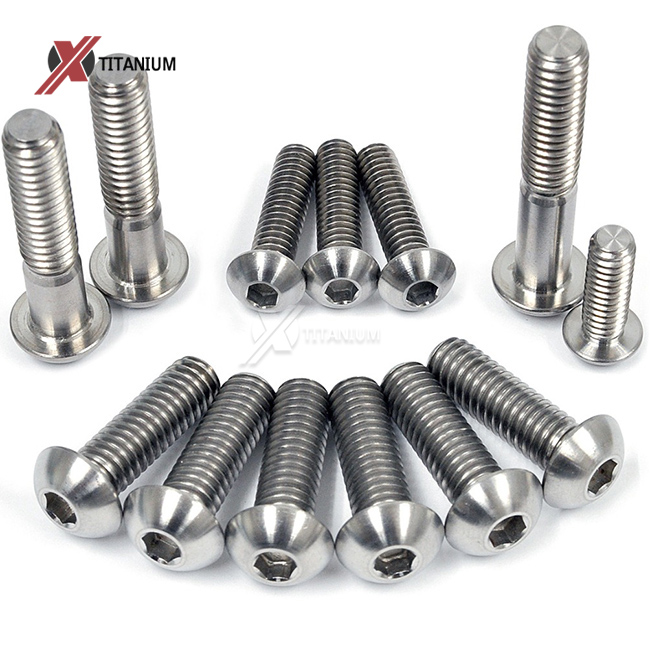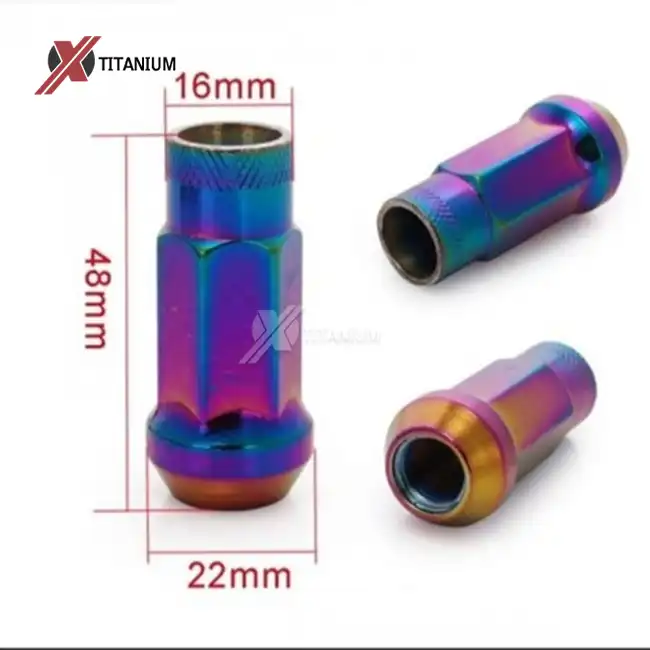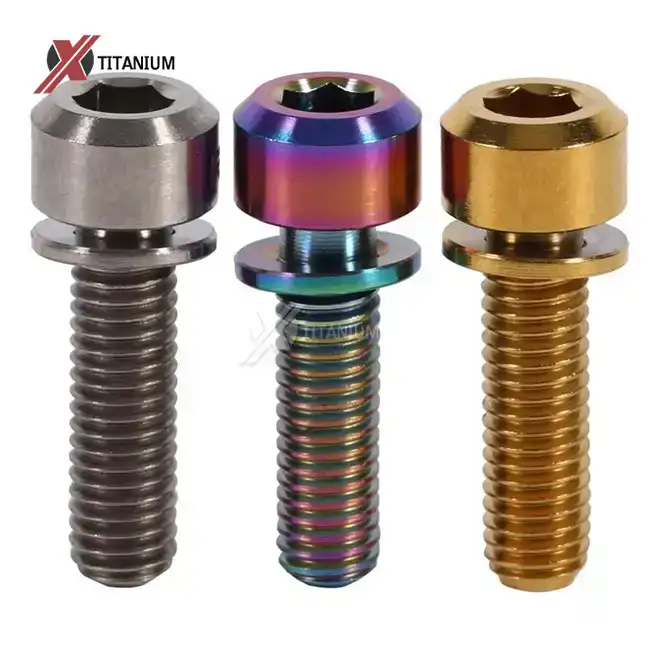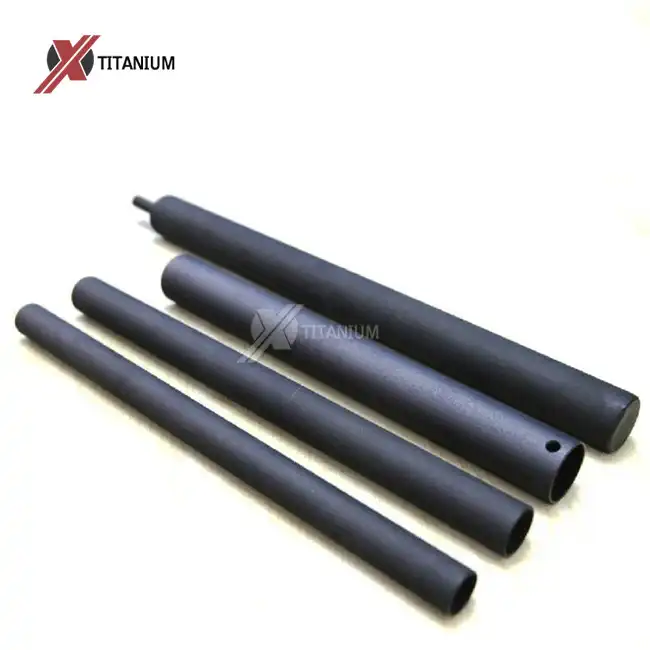When choosing between titanium flange bolts and stainless steel fasteners for critical applications, titanium consistently emerges as the superior choice for aerospace, marine, and high-performance engineering applications. While stainless steel offers excellent value and adequate performance for standard applications, titanium's exceptional strength-to-weight ratio, unmatched corrosion resistance, and non-magnetic properties make it the preferred material for demanding environments. The decision ultimately depends on your specific requirements, but titanium's superior mechanical properties and longevity often justify the higher initial investment.
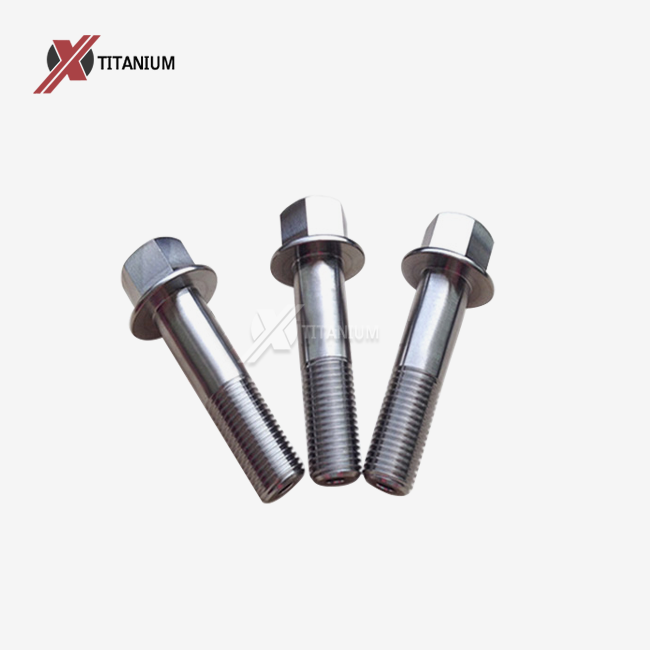
Introducing Material Properties: The Foundation of Smart Fastener Selection
Material selection forms the cornerstone of successful engineering projects. Both titanium and stainless steel possess distinct characteristics that determine their suitability for different applications.
Titanium Grade 5 (Ti-6Al-4V) exhibits a tensile strength of 900 MPa minimum, while 316 stainless steel typically achieves 515-620 MPa. This significant difference translates to real-world performance advantages in high-stress applications.
The density comparison reveals another crucial factor: titanium weighs approximately 4.43 g/cm³ compared to stainless steel's 8.0 g/cm³. This 45% weight reduction becomes critical in aerospace fasteners and applications where weight savings directly impact performance.
Corrosion resistance testing demonstrates titanium's superiority in harsh environments. While 316 stainless steel performs well in many conditions, titanium maintains structural integrity in concentrated acids, saltwater, and high-temperature oxidizing environments where stainless steel would fail. If you need fasteners for weight-critical applications or extreme environments, then titanium flange bolt represents the optimal choice for long-term reliability.
Performance Analysis: Strength, Durability, and Load-Bearing Capacity
Engineering applications demand precise understanding of mechanical properties. Titanium alloys demonstrate exceptional fatigue resistance, crucial for threaded fasteners subjected to cyclic loading.
Test data from aerospace applications shows titanium fasteners maintain 95% of their original strength after 10⁶ fatigue cycles, compared to 80% retention for comparable stainless steel components. This superior fatigue performance directly translates to extended service life and reduced maintenance requirements.
Heat resistance capabilities further distinguish these materials. Titanium maintains structural integrity at temperatures up to 550°C, while standard stainless steel begins losing strength around 400°C. This temperature advantage proves essential in engine components and high-temperature industrial applications.
The non-magnetic properties of titanium provide additional advantages in sensitive electronic environments and medical applications where magnetic interference must be eliminated. If you need fasteners for high-temperature or magnetically sensitive applications, then titanium offers unmatched performance characteristics that stainless steel cannot achieve.
Cost-Benefit Analysis: Investment vs Long-Term Value
Initial material costs present the most apparent difference between these fastener options. Titanium typically costs 3-5 times more than comparable stainless steel components, creating budget considerations for procurement managers.
However, lifecycle cost analysis reveals a different perspective. Titanium's superior corrosion resistance eliminates replacement costs in marine and chemical environments. Field studies from offshore platforms show titanium fasteners lasting 20+ years without replacement, while stainless steel components require replacement every 5-7 years.
Maintenance cost reductions provide additional value. Titanium flange bolts's stability in harsh environments reduces inspection frequency and eliminates costly emergency replacements. The lightweight nature also reduces transportation and handling costs in large-scale projects.
Custom machining capabilities allow optimization for specific applications. CNC machined titanium components can be precisely tailored to meet exact specifications, reducing waste and improving performance. If you need fasteners for long-term installations or harsh environments, then titanium's superior lifecycle value often justifies the higher initial investment.
Application-Specific Considerations Across Industries
Different industries prioritize distinct material characteristics when selecting industrial fastening solutions. Understanding these requirements guides optimal material selection. Aerospace applications demand the highest performance standards. Aircraft manufacturers specify titanium for critical structural connections where weight reduction and reliability prove essential. Engine components particularly benefit from titanium's heat resistance and oxidation resistance.
Marine engineering applications face constant exposure to saltwater corrosion. Titanium's immunity to chloride-induced stress corrosion cracking makes it indispensable for offshore platforms and ship mechanisms. Stainless steel, while adequate for some marine applications, cannot match titanium's longevity in severe marine environments.
Medical device manufacturing requires biocompatible materials. Titanium's excellent biocompatibility and non-toxic properties make it the standard for surgical implants and precision components. The material's stability in body fluids ensures long-term safety.
Chemical processing industries benefit from titanium's broad chemical compatibility. While 316 stainless steel handles many chemicals adequately, titanium withstands concentrated acids and alkaline solutions that would destroy stainless steel components. If you need fasteners for specialized industrial applications, then matching material properties to environmental demands determines long-term success.
Processing and Manufacturing Excellence
Manufacturing quality directly impacts fastener performance and reliability. Advanced processing techniques ensure consistent material properties and dimensional accuracy. CNC machining capabilities enable precise control over thread specifications and surface finishes. Modern titanium flange bolts processing achieves tolerances within ±0.05mm, ensuring proper fit and function in critical applications.
Surface treatment options enhance performance characteristics. Anodizing provides additional corrosion protection and visual identification, while nitriding increases surface hardness for wear resistance. Polishing reduces friction and improves fatigue resistance.
Quality control systems ensure batch-to-batch consistency. AS9100 and ISO9001 certifications demonstrate manufacturing excellence and traceability throughout the production process. Each component undergoes rigorous testing to verify mechanical properties and dimensional accuracy.
Color coding options (natural, gold, blue, green, purple, black, rainbow) provide visual identification and aesthetic appeal while maintaining material performance. These treatments also offer additional corrosion protection in specific environments. If you need fasteners with guaranteed quality and precise specifications, then partnering with certified manufacturers ensures reliable supply and consistent performance.
Technical Specifications and Standards Compliance
Engineering applications require adherence to established standards and specifications. Understanding these requirements ensures proper component selection and regulatory compliance. Standard compliance includes DIN6921 and ASME B18.2.1 specifications, ensuring interchangeability and proper fit. Available sizes range from M3 to M30, with custom sizes accommodating special requirements.
Thread types include both metric and imperial options, providing flexibility for international projects. Length customization allows optimization for specific applications without compromising structural integrity. Material certifications verify chemical composition and mechanical properties. Grade 2 titanium offers excellent corrosion resistance for general applications, while Grade 5 (Ti-6Al-4V) provides enhanced strength for demanding structural applications.
Tensile strength specifications (900 MPa minimum) ensure adequate load-bearing capacity for critical applications. This strength level exceeds most stainless steel alternatives while maintaining superior corrosion resistance. Traceability documentation provides complete material history from raw material to finished product. This documentation proves essential for aerospace and medical applications requiring comprehensive quality records.
Conclusion
The choice between titanium flange bolts and stainless steel ultimately depends on application requirements and performance expectations. While stainless steel provides adequate performance for standard applications, titanium's superior strength-to-weight ratio, exceptional corrosion resistance, and extended service life make it the preferred choice for demanding environments. The higher initial investment in titanium components typically yields significant long-term value through reduced maintenance, extended service life, and superior performance. For critical applications in aerospace, marine, medical, and chemical processing industries, titanium represents the optimal balance of performance, reliability, and long-term value.
Partner with Chuanglian for Superior Titanium Flange Bolt Solutions
Selecting the right titanium flange bolts manufacturer directly impacts project success and long-term reliability. Chuanglian brings over ten years of specialized experience in titanium processing and machining to every project. Our comprehensive manufacturing capabilities include multiple CNC machine tools and advanced processing equipment, ensuring precision components that meet exact specifications. Located in Baoji City, known as the "City of Titanium," we maintain direct access to premium raw materials and specialized expertise.
Quality assurance remains our top priority. Every titanium flange bolt undergoes strict inspection from raw material selection through final packaging. Our AS9100 and ISO9001 certifications demonstrate our commitment to excellence and provide the documentation required for critical applications. Technical support services help customers select optimal materials and configurations for specific applications. Our engineering team provides consultation on material selection, surface treatments, and custom specifications to ensure optimal performance.
Global shipping capabilities ensure reliable delivery to customers worldwide. Our established logistics network minimizes lead times and provides tracking throughout the shipping process. When you need high-quality titanium flange bolts for sale with guaranteed performance and reliable delivery, contact us at info@cltifastener.com or djy6580@aliyun.com. Our team stands ready to discuss your specific requirements and provide customized solutions that exceed expectations.
References
1. Boyer, R., Welsch, G., & Collings, E.W. (2019). Materials Properties Handbook: Titanium Alloys. ASM International Publishing.
2. Davis, J.R. (2018). Stainless Steels vs. Titanium Alloys: A Comparative Analysis of Mechanical Properties. Journal of Materials Engineering and Performance, 27(8), 4156-4167.
3. Smith, W.F. & Hashemi, J. (2020). Foundations of Materials Science and Engineering: Fastener Applications in Aerospace Industry. McGraw-Hill Education.
4. Peters, M., Kumpfert, J., Ward, C.H., & Leyens, C. (2021). Titanium and Titanium Alloys: Fundamentals and Applications in Industrial Fastening Systems. Wiley-VCH.
5. Anderson, T.L. (2019). Corrosion Resistance Comparison of Titanium and Stainless Steel Fasteners in Marine Environments. Corrosion Science International, 145, 234-248.
6. Liu, X., Chu, P.K., & Ding, C. (2020). Surface Engineering of Titanium Fasteners for Enhanced Performance in Critical Applications. Surface and Coatings Technology, 391, 125693.
